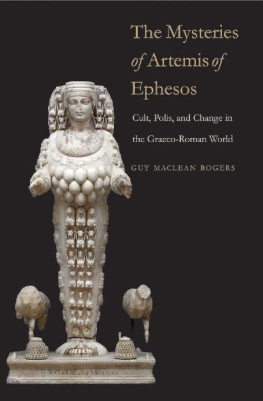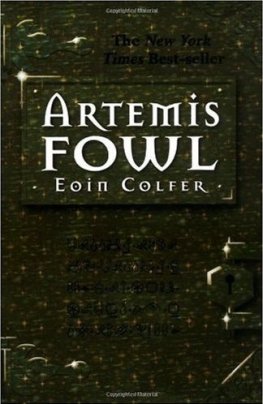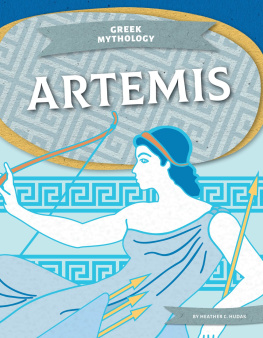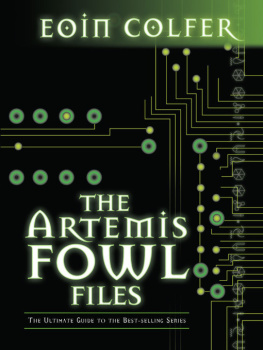Guy MacLean Rogers - The Mysteries of Artemis of Ephesos (Synkrisis)
Here you can read online Guy MacLean Rogers - The Mysteries of Artemis of Ephesos (Synkrisis) full text of the book (entire story) in english for free. Download pdf and epub, get meaning, cover and reviews about this ebook. year: 2012, publisher: Yale University Press, genre: Romance novel. Description of the work, (preface) as well as reviews are available. Best literature library LitArk.com created for fans of good reading and offers a wide selection of genres:
Romance novel
Science fiction
Adventure
Detective
Science
History
Home and family
Prose
Art
Politics
Computer
Non-fiction
Religion
Business
Children
Humor
Choose a favorite category and find really read worthwhile books. Enjoy immersion in the world of imagination, feel the emotions of the characters or learn something new for yourself, make an fascinating discovery.
- Book:The Mysteries of Artemis of Ephesos (Synkrisis)
- Author:
- Publisher:Yale University Press
- Genre:
- Year:2012
- Rating:4 / 5
- Favourites:Add to favourites
- Your mark:
- 80
- 1
- 2
- 3
- 4
- 5
The Mysteries of Artemis of Ephesos (Synkrisis): summary, description and annotation
We offer to read an annotation, description, summary or preface (depends on what the author of the book "The Mysteries of Artemis of Ephesos (Synkrisis)" wrote himself). If you haven't found the necessary information about the book — write in the comments, we will try to find it.
The Mysteries of Artemis of Ephesos (Synkrisis) — read online for free the complete book (whole text) full work
Below is the text of the book, divided by pages. System saving the place of the last page read, allows you to conveniently read the book "The Mysteries of Artemis of Ephesos (Synkrisis)" online for free, without having to search again every time where you left off. Put a bookmark, and you can go to the page where you finished reading at any time.
Font size:
Interval:
Bookmark:
Comparative Approaches to Early Christianity in Greco-Roman Culture
Dale B. Martin (Yale University) and L. L. Welborn (Fordham University)
Synkrisis is a project that invites scholars of Early Christianity and the Greco-Roman world to collaborate toward the goal of rigorous comparison. Each volume in the series provides immersion in an aspect of Greco-Roman culture, so as to make possible a comparison of the controlling logics that emerge from the discourses of Greco-Roman and early Christian writers. In contrast to older history of religions approaches, which looked for similarities between religions in order to posit relations of influence and dependence, Synkrisis embraces a fuller conception of the complexities of culture, viewing Greco-Roman religions and early Christianity as members of a comparative class. The differential comparisons promoted by Synkrisis may serve to refine and correct the theoretical and historical models employed by scholars who seek to understand and interpret the Greco-Roman world. With its allusion to the rhetorical exercises of the Greco-Roman world, the series title recognizes that the comparative enterprise is a construction of the scholar's mind and serves the scholar's theoretical interests.
Loveday Alexander (Sheffield University)
John Bodell (Brown University)
Kimberly Bowes (University of Pennsylvania)
Daniel Boyarin (University of California, Berkeley)
Fritz Graf (Ohio State University)
Ronald F. Hock (University of Southern California)
Hans-Josef Klauck (University of Chicago)
Stanley K. Stowers (Brown University)
Angela Standhartinger (Marburg University)
Cult, Polis, and Change in the Graeco-Roman World
GUY MACLEAN ROGERS

Copyright 2012 by Yale University.
All rights reserved.
This book may not be reproduced, in whole or in part, including illustrations, in any form (beyond that copying permitted by Sections 107 and 108 of the U.S. Copyright Law and except by reviewers for the public press), without written permission from the publishers.
The photographs in this book are by the author.
Yale University Press books may be purchased in quantity for educational, business, or promotional use. For information, please e-mail sales.press@yale.edu (U.S. office) or sales@yaleup.co.uk (U.K. office).
Designed by Sonia Shannon.
Set in Garamond type by Tseng Information Systems, Inc.
Printed in the United States of America by
Sheridan Books.
Library of Congress Cataloging-in-Publication Data
Rogers, Guy MacLean.
The mysteries of Artemis of Ephesos : cult, polis, and change in the Graeco-Roman world / Guy MacLean Rogers.
p. cm. (Synkrisis : comparative approaches to early Christianity in Greco-Roman culture)
Includes bibliographical references (p. ) and index.
ISBN 978-0-300-17863-0 (alk. paper)
1. Artemis (Greek deity) Cult TurkeyEphesus (Extinct city) 2. Ephesus (Extinct city) Religion.
I. Title.
BL820.D5R64 2012
282.080939'23 dc23
2012011998
A catalogue record for this book is available from the British Library.
This paper meets the requirements of ANSI/NISO Z39.48-1992 (Permanence of Paper).
10 9 8 7 6 5 4 3 2 1
For Nancy L. Thompson
Only you beneath the moon and under the sun
Wo bin ich? Ist's Phantasie, da ich noch lebe?
Oder hat eine hhere Macht mich gerettet?
Where am I? Is it a dream or am I still alive?
Or have I been saved by some higher power?
Tamino, Die Zauberflte, Act 1, scene 1
ANATHEMA
Accipite et bibite ex eo omnes:
hie est enim calix sanguinis mei
novi et aeterni testamenti,
qui pro vobis et pro multis effundetur
in remissionem peccatorum.
Hoc facite in meam commemorationem.
And with those words, Father Griffin leaned over the row of blue-suited thirteen-year-olds who kneeled before him at St. Theresa's in 1964, and one by one placed Jesus's body on their tongues. Then, as he began to pour out small cups of the savior's blood for the boys to drink, the chorus at the back of the church started to sing:
Mysterium fidei
Thirty-six years later in the same church, moments before another line of kneeling youths prepared to taste Christ's body and blood, Father Kwiatkowski spoke these words:
Take and drink this all of you:
for this is the chalice of my blood
of the new and eternal covenant,
which shall be poured out for you
and for the many in remission of sins.
Do this in commemoration of me.
Just as the Father recited the last line, the chorus at the back of the church broke into song:
The mystery of faith
When and how do a wafer and a cup of wine become the body and blood of Christ? Are Jesus's body and blood the same in Latin and English? Does it matter whether the savior's body and blood are given to those receiving communion by a priest of Irish or Polish descent? Is a mysterium fidei the same thing as a mystery of faith?
This is a book about cultic change in context. It tells the story of one ancient mystery cult, based upon all of the surviving evidence. The story ends with the disappearance of the cult during the third century A.D. In the last chapter of this book I set out what I think are some of the wider implications of this study for our understanding of mystery cults, the Graeco-Roman polis, ancient polytheism, anthropological theories of initiation rituals, and the fields of evolutionary psychology and neuroscience. Both initiates and hierophants of these subjects should be interested in these implications.
A study that ends with a cult's demise might be interpreted as a story of failure; however, the opposite is the case. The story of the celebration of the mysteries of Artemis at Ephesos is a tale of almost unimaginable success. The Ephesians celebrated the goddess's mysteries from at least the mid-fourth century B.C. into the mid-third century A.D. nearly six hundred years. If that is religious failure, seldom can a cult have failed so successfully.
Of greater interest is the question of why this cult survived as long as it did. In this book I argue that it was the Ephesians' willingness to adapt the theology and ritual practices of the cult to changed political, social, and economic circumstances that was the key factor in the cult's success and longevity. Indeed, I make the case that the flexibility of those who managed and took part in this cult helps to explain why polytheism was the dominant system of belief for the majority of the inhabitants of the Mediterranean world from the period of our first evidence of Greek writing in the middle of the second millennium B.C. until well into the fifth century A.D. Although the majority of the circa seven billion people on the face of the earth today are adherents of one of the Abrahamic religious traditions, it is worth reflecting upon the fact that for most of literate human history the majority of people for whom we have any material or literary evidence at all have been polytheists.
A flexible system of belief and practice founded upon the idea that a multiplicity of divinities or divine forces govern the world and that human beings and those divinities need each other, indeed may require each other for salvation best explained life both as lived and as imagined for the vast majority of people who lived in the ancient Mediterranean world. Whether such a system reflects and explains the reality of human experience more or less persuasively than other options, such as henotheism, Abrahamic monotheism, or atheism, will be up to readers to decide. A strategic comparison of some of these options and a hypothesis about why the religions of the book finally were more persuasive to the inhabitants of the ancient world is suggested in the conclusion of this work.
Font size:
Interval:
Bookmark:
Similar books «The Mysteries of Artemis of Ephesos (Synkrisis)»
Look at similar books to The Mysteries of Artemis of Ephesos (Synkrisis). We have selected literature similar in name and meaning in the hope of providing readers with more options to find new, interesting, not yet read works.
Discussion, reviews of the book The Mysteries of Artemis of Ephesos (Synkrisis) and just readers' own opinions. Leave your comments, write what you think about the work, its meaning or the main characters. Specify what exactly you liked and what you didn't like, and why you think so.












